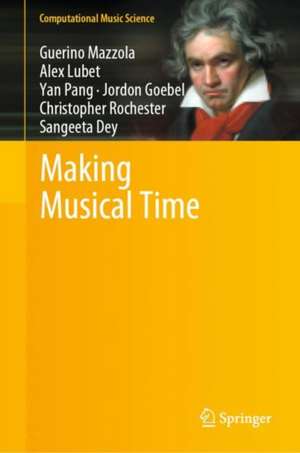Making Musical Time: Computational Music Science
Autor Guerino Mazzola, Alex Lubet, Yan Pang, Jordon Goebel, Christopher Rochester, Sangeeta Deyen Limba Engleză Hardback – 16 noi 2021
The mathematical methods applied for the construction of musical time are totally new. They relate to category theory (projective limits) and the mathematical theory of gestures. These methods and results extend the music theory of time but also apply to the applied performative understanding of making music. In addition, it is the very first approach to a constructive theory of time, deduced from the recent theory of musical gestures and their categories.
Making Musical Time is intended for a wide audience of scholars with interest in music. These include mathematicians, music theorists, (ethno)musicologists, music psychologists / educators / therapists, music performers, philosophers of music, audiologists, and acousticians.
| Toate formatele și edițiile | Preț | Express |
|---|---|---|
| Paperback (1) | 725.92 lei 43-57 zile | |
| Springer International Publishing – 17 noi 2022 | 725.92 lei 43-57 zile | |
| Hardback (1) | 729.53 lei 43-57 zile | |
| Springer International Publishing – 16 noi 2021 | 729.53 lei 43-57 zile |
Din seria Computational Music Science
- 24%
 Preț: 913.53 lei
Preț: 913.53 lei - 18%
 Preț: 726.85 lei
Preț: 726.85 lei - 20%
 Preț: 596.63 lei
Preț: 596.63 lei - 20%
 Preț: 589.20 lei
Preț: 589.20 lei -
 Preț: 388.13 lei
Preț: 388.13 lei - 15%
 Preț: 648.05 lei
Preț: 648.05 lei - 20%
 Preț: 326.32 lei
Preț: 326.32 lei - 20%
 Preț: 333.04 lei
Preț: 333.04 lei - 20%
 Preț: 335.52 lei
Preț: 335.52 lei - 20%
 Preț: 308.98 lei
Preț: 308.98 lei - 20%
 Preț: 597.29 lei
Preț: 597.29 lei - 20%
 Preț: 505.81 lei
Preț: 505.81 lei - 20%
 Preț: 504.98 lei
Preț: 504.98 lei - 20%
 Preț: 940.47 lei
Preț: 940.47 lei - 24%
 Preț: 745.83 lei
Preț: 745.83 lei - 24%
 Preț: 612.93 lei
Preț: 612.93 lei - 20%
 Preț: 501.20 lei
Preț: 501.20 lei - 20%
 Preț: 533.76 lei
Preț: 533.76 lei - 18%
 Preț: 725.92 lei
Preț: 725.92 lei - 15%
 Preț: 579.99 lei
Preț: 579.99 lei -
 Preț: 487.96 lei
Preț: 487.96 lei - 18%
 Preț: 1116.26 lei
Preț: 1116.26 lei
Preț: 729.53 lei
Preț vechi: 889.68 lei
-18% Nou
Puncte Express: 1094
Preț estimativ în valută:
139.64€ • 151.73$ • 117.37£
139.64€ • 151.73$ • 117.37£
Carte tipărită la comandă
Livrare economică 21 aprilie-05 mai
Preluare comenzi: 021 569.72.76
Specificații
ISBN-13: 9783030856281
ISBN-10: 3030856283
Pagini: 265
Ilustrații: XIII, 265 p. 100 illus., 40 illus. in color.
Dimensiuni: 155 x 235 mm
Greutate: 0.5 kg
Ediția:1st ed. 2021
Editura: Springer International Publishing
Colecția Springer
Seria Computational Music Science
Locul publicării:Cham, Switzerland
ISBN-10: 3030856283
Pagini: 265
Ilustrații: XIII, 265 p. 100 illus., 40 illus. in color.
Dimensiuni: 155 x 235 mm
Greutate: 0.5 kg
Ediția:1st ed. 2021
Editura: Springer International Publishing
Colecția Springer
Seria Computational Music Science
Locul publicării:Cham, Switzerland
Cuprins
Part I Ontological Orientation.- 1. Ontology, Oniontology, and the (History and Present Stage.- 5. Genealogy and Ontology of Human Time Perception.- Part III Musical Time Concepts.- 6. Meters and Rhythm.- 7. Structures of Organized Time.- 8. Musical Gestures.- 9. Kramer’s Time Concepts.- 10. Distributed Identity in Music.- Part IV New Developments on Musical Time Concepts.- 11. Limits of Gestural Diagrams.- 12. Imaginary Time.- 13. Mathematical Modeling Kramer’s Time Concepts.- 14. Functorial Semiotics of Time.- 15. Jordon, Chris, and Renan: Application of these theories.- 16. Experiments with Local and Global Rhythms.- Part V Conclusions.- 17. Time Constructs as a Deeply Musical Endeavor.- 18. Art of Time.- 19. Human Create their Own Time.- Part VI References, Index.
Textul de pe ultima copertă
This book is a comprehensive examination of the conception, perception, performance, and composition of time in music across time and culture. It surveys the literature of time in mathematics, philosophy, psychology, music theory, and somatic studies (medicine and disability studies) and looks ahead through original research in performance, composition, psychology, and education. It is the first monograph solely devoted to the theory of construction of musical time since Kramer in 1988, with new insights, mathematical precision, and an expansive global and historical context.
The mathematical methods applied for the construction of musical time are totally new. They relate to category theory (projective limits) and the mathematical theory of gestures. These methods and results extend the music theory of time but also apply to the applied performative understanding of making music. In addition, it is the very first approach to a constructive theory of time, deduced from the recent theory of musical gestures and their categories.
Making Musical Time is intended for a wide audience of scholars with interest in music. These include mathematicians, music theorists, (ethno)musicologists, music psychologists / educators / therapists, music performers, philosophers of music, audiologists, and acousticians.
The mathematical methods applied for the construction of musical time are totally new. They relate to category theory (projective limits) and the mathematical theory of gestures. These methods and results extend the music theory of time but also apply to the applied performative understanding of making music. In addition, it is the very first approach to a constructive theory of time, deduced from the recent theory of musical gestures and their categories.
Making Musical Time is intended for a wide audience of scholars with interest in music. These include mathematicians, music theorists, (ethno)musicologists, music psychologists / educators / therapists, music performers, philosophers of music, audiologists, and acousticians.
Caracteristici
Applies concepts and methods to the concrete making of time in composition and performance A new mathematically explicit, precise theory of time in music First work of its kind
